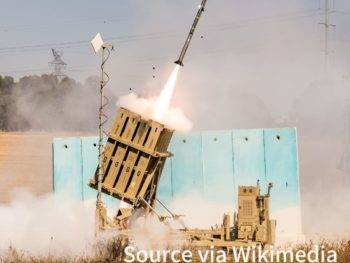In a tumultuous turn of events on Saturday night, Israel found itself amidst a flurry of air raid alerts, prompting residents to seek shelter as explosions reverberated across the country. The sound of air defenses being activated echoed through the night, signaling the imminent threat faced by the nation. Despite the chaos, Israel’s robust defense mechanisms swiftly sprung into action, intercepting numerous drones and missiles launched from various neighboring countries. The skies illuminated with interceptions as Israel’s allies joined forces to thwart the incoming threats, preventing any significant damage to Israeli territory.
The intensity of the situation was palpable as the confrontation escalated, with at least nine countries embroiled in the conflict. From Iran to Yemen, projectiles were launched towards Israel, only to be met with a staunch defense from Israel, supported by the United States, the United Kingdom, France, and Jordan. The coordinated effort to neutralize the threat underscored the gravity of the situation and the determination to safeguard Israel’s sovereignty.
Iran’s Aggressive Assault: Drones, Missiles, and Ballistic Attacks
The focal point of the military escalation centered on Iran’s aggressive assault, characterized by a barrage of drones, missiles, and ballistic attacks aimed at Israel. The Israeli military disclosed that more than 300 drones and missiles were launched from Iran, constituting a multifaceted onslaught intended to overwhelm Israel’s defenses. Among the arsenal deployed were 170 drones and 30 cruise missiles, meticulously intercepted before breaching Israeli airspace. However, the gravity of the situation intensified as 110 ballistic missiles were unleashed, with a fraction managing to penetrate Israel’s defenses, albeit causing minimal impact.
Rear Admiral Daniel Hagari, spokesperson for the Israeli military, provided insights into the orchestrated attack, emphasizing the coordinated nature of the assault. The proximity of Iran to Israel, spanning approximately 1,000km across Iraq, Syria, and Jordan, facilitated the swift deployment of projectiles, posing a significant challenge to Israel’s defense apparatus. While the figures provided by the Israeli military await independent verification, the sheer scale of the offensive underscores the severity of the threat posed by Iran’s belligerent actions.
Regional Entanglement: Cross-Border Escalation and Annexation Dispute
The conflict transcended national borders, manifesting in a regional entanglement involving multiple actors and territories. Iran’s Revolutionary Guards Corps (IRGC) spearheaded the assault, launching a coordinated barrage of drones and missiles, with Iraq serving as a conduit for the projectiles en route to Israel. The deliberate timing of the ballistic missile launch, synchronized with the drone assault, accentuated the strategic intent behind the attack, aimed at maximizing the impact on Israeli territory.
Amidst the chaos, Hezbollah, an Iran-backed militant group based in Lebanon, further escalated tensions by launching rockets at an Israeli military base in the occupied Golan Heights. The strategic plateau, annexed by Israel from Syria, remains a contentious issue, with its status unrecognized by most of the international community. Hezbollah’s provocative actions not only exacerbated the conflict but also reignited longstanding territorial disputes, amplifying the volatility of the situation.
As Israel grapples with the aftermath of the intense military escalation, the ramifications of the cross-border confrontation reverberate across the region, underscoring the fragility of peace in the Middle East. With tensions simmering and the specter of conflict looming large, the international community remains vigilant, closely monitoring developments and advocating for diplomatic solutions to de-escalate the crisis.
Israel and Allies Thwart Drone and Missile Attacks
In a remarkable display of defense capability, Israel and its allies successfully intercepted the vast majority of drones and missiles launched in a recent attack. Rear Admiral Hagari disclosed that an astounding 99% of the incoming barrage was neutralized, either before breaching Israeli airspace or while within the country’s borders. This feat underscores the effectiveness of Israel’s defense systems in safeguarding its citizens from aerial threats.
The intercepted projectiles encompassed a range of weaponry, including drones, cruise missiles, and ballistic missiles. Notably, even ballistic missiles, known for their high-speed, arcing trajectory, were foiled, thanks to Israel’s robust defense infrastructure. The precision with which these threats were neutralized highlights the sophistication and reliability of Israel’s defense mechanisms.
International Support Bolsters Israeli Defense
The successful interception operation received significant support from international allies, further enhancing Israel’s defensive capabilities. US President Joe Biden lauded the collaborative effort, emphasizing the pivotal role of US forces in aiding Israel’s defense. Preemptive measures, such as deploying aircraft and warships to the region, underscore the proactive approach taken to counter potential threats.
Additionally, the United Kingdom and Jordan played crucial roles in thwarting the attack. UK RAF Typhoon jets, operating alongside US forces, contributed to the interception of Iranian attack drones. Jordan, while maintaining a peace treaty with Israel, remained vigilant in securing its airspace and protecting its citizens from potential harm. This unified response demonstrates the solidarity among allies in confronting shared security challenges.
As tensions persist in the region, the collaborative efforts of Israel and its allies serve as a deterrent against further aggression. The successful interception of drones and missiles underscores the importance of international cooperation in preserving peace and security in the Middle East.
Germany Condemns Iranian Attacks: A Strong Warning Against Escalation
Germany has issued a resounding condemnation of Iran’s recent attacks, with Chancellor Olaf Scholz’s spokesman delivering a stern message warning Tehran of the dire consequences of its actions. The spokesperson emphasized Germany’s unwavering support for Israel and underscored the gravity of Iran’s aggression, labeling it as “irresponsible and unjustifiable.” This unequivocal stance from Germany signals a unified front against Iran’s destabilizing behavior in the region.
The German government’s strong condemnation comes amidst escalating tensions following Iran’s attack, which has heightened the risk of a full-blown regional conflict. By aligning closely with Israel, Germany is sending a clear message to Tehran that its aggressive actions will not go unchecked. As diplomatic efforts intensify to defuse the crisis, Germany’s unequivocal condemnation adds significant weight to international efforts aimed at preventing further escalation and restoring stability to the region.
Escalation Will Take Region Into Perilous Territory: Analysis and Implications
The recent escalation in hostilities between Iran and Israel has brought the region to the brink of a dangerous precipice, with the potential for widespread conflict looming large. Analysts warn that the current situation poses significant risks, as both sides appear poised to escalate further in response to perceived provocations.
Iran’s decision to launch a more extensive attack on Israel underscores the deepening crisis and the escalating cycle of violence gripping the region. With Tehran determined to assert its sovereignty and retaliate against perceived threats, the risk of miscalculation and unintended consequences has never been higher.
As Israel weighs its response to Iran’s aggression, the stakes are exceptionally high. The absence of a sophisticated air defense system in Iran leaves the country vulnerable to retaliatory strikes, raising concerns about the potential for disproportionate escalation. Moreover, the lack of clear channels for de-escalation further complicates efforts to defuse the crisis, leaving the region teetering on the edge of an unprecedented and potentially catastrophic conflict.
The escalating tensions between Iran and Israel pose a grave threat to regional stability, with the potential to spiral into a broader conflict with far-reaching consequences. As the international community scrambles to prevent further escalation, the urgency of finding a diplomatic solution to the crisis has never been greater.
Table of Contents
Discover more from OGM News NG
Subscribe to get the latest posts sent to your email.













